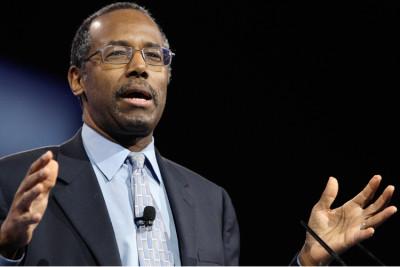


White House hopeful Carson bristles under intense scrutiny

Ben Carson soared to the top of the 2016 Republican presidential heap with a compelling personal narrative, but questions about his past and a disputed military scholarship now threaten to disrupt his high-flying campaign.
The retired doctor has riveted audiences for months with vivid descriptions of how he lived a violent adolescence — including trying to kill a classmate when he was 14 — before vanquishing his anger to become a world-renowned neurosurgeon.
His political outsider candidacy has gained momentum, and he finds himself tied for the lead with billionaire Donald Trump in the Republican nomination race, besting establishment candidates like Jeb Bush.
But his campaign success has begun to draw closer scrutiny from observers and US media diving deeper into Carson’s claims about his volatile background growing up poor in Detroit.
The digging has found discrepancies, inconsistencies and, in the latest revelations on Friday, apparent falsifications.
Carson’s campaign acknowledged that his account of being offered a scholarship to the prestigious US Military Academy at West Point was wrong, Politico reported.
The candidate has made West Point an inspirational part of his personal narrative, writing about it in his autobiography, “Gifted Hands.”
In that account, he said that as a high school senior who had turned his life around and was rising in the Reserve Officer Training Corps (ROTC) in Detroit, he got to meet famed Army general William Westmoreland.
“I had dinner with him and the Congressional Medal winners. Later I was offered a full scholarship to West Point,” Carson wrote in his book.
But according to Politico, West Point said it had no record of Carson applying or being offered admission.
An education at the US Army’s premier school for prospective officers is free for all its students, so there are no scholarships per se.
With the story snowballing, Carson went into damage control mode.
“I don’t remember all the specific details,” he told The New York Times.
“Because I had done so extraordinarily well you know I was told that someone like me -– they could get a scholarship to West Point. But I made it clear I was going to pursue a career in medicine,” he said.
“It was, you know, an informal ‘with a record like yours we could easily get you a scholarship to West Point.'”
During a press conference in Florida, a sometimes agitated Carson said he does not remember the names of the people who made what he interpreted as an offer of a West Point scholarship.
“It’s almost 50 years ago. I bet you don’t remember the people you talked to 50 years ago,” Carson told reporters.
“There is a desperation on behalf of some to try to find a way to tarnish me because they have been looking through everything.
“It has to be a scandal or something. They are getting desperate. Next week, it will be my kindergarten teacher who said I peed in my pants. It is ridiculous. It’s okay because I totally expect it,” Carson added.
Carson had earlier spoken of West Point on August 13. In response to a voter’s question, he posted on Facebook that he “was thrilled to get an offer from West Point. But I knew medicine is what I wanted to do.”
Asked Friday by Fox News whether he should have been more clear about West Point in his book, Carson said: “I guess it could have been more clarified. I told it as I understood it.”
– ‘Expect scrutiny’ –
The soft-spoken, Yale-educated Carson has spoken powerfully of his turbulent childhood, his “pathological” temper and spiritual redemption.
He has described trying to stab a classmate, only to learn that the boy’s belt buckle broke the blade before it could enter his abdomen.
Carson has mentioned numerous other violent episodes, including attempting to hit his mother with a hammer, and punching a boy in the head while holding a metal lock.
CNN reported that nine of Carson’s friends, classmates or neighbors told the network that they had no memory of the kind of violence described by the candidate.
Carson told CNN “I changed the names” of several of the victims to respect their privacy.
But he insisted the incidents had in fact occurred, and suggested US media were concocting “a bunch of lies” about him.
“I think it’s pathetic and basically what the media does is they try to get you distracted with all of this stuff so that you don’t talk about the things that are important,” Carson said.
Presidential expert Peter Kastor, a professor at Washington University in St. Louis, offered a message for White House hopefuls: get used to it.
“They should expect scrutiny,” Kastor told AFP.
“Presidential candidates since John F Kennedy have put their private lives on public display for public purpose,” and the media remains duty-bound to investigate them, he said.
Source: TheGuardian
Share this post
Naijanetwork Forum Statistics
Threads: 15076,
Posts: 18162,
Members: 6774


